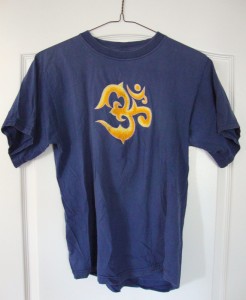Events with Probability Zero
I just donated this shirt to the Salvation Army. I estimate the probability that I will ever see this shirt again to be zero. In fact, forget estimating: I think the probability that I will see this shirt again is exactly zero.
In fact, I’ll go even further than that: I claim that the probability that anyone who reads this ever sees this shirt is exactly zero. Not .0000000000001. Zero.
Even if there are infinitely many possible scenarios in which this shirt is seen by someone, this number is dwarfed by the infinitude of possible scenarios in total. Thus
moderate infinity ÷ really big infinity = zero
I dropped it off at the Salvation Army in Brooklyn. Let me know if you see it: evidence will be required to claim your prize.

9 Comments
Nikita Zolotykh · August 30, 2010 at 11:56 pm
Good thinking, but I think because you just posted this up, the probability increased from zero to something. Some people might be crazy enough to harass the Salvation Army for your shirt.
Also, now I’m curious to know what would the prize be :D.
Colin null Beveridge · October 23, 2010 at 12:06 pm
What precisely do you mean by “moderate infinity” and “really big infinity”? Infinities of the same type are the same size (there are as many numbers in the 17 times table as there are whole numbers). So, if dividing infinities by each other was defined, I’d have thought the answer was 1 rather than 0 😉
MrHonner · October 23, 2010 at 12:22 pm
I guess that means you’ve seen my shirt? 🙂
Colin null Beveridge · October 23, 2010 at 12:26 pm
Haha! Yes, of course, there’s a picture of it right there 😀
Moral of the story is, don’t try and do arithmetic with infinities… or else you could argue that nothing would ever happen.
Mexico · November 9, 2010 at 10:44 pm
What this seems to amount to is “highly improbable is a synonym for impossible,” a statement which simply isn’t true.
MrHonner · November 11, 2010 at 9:49 am
I think the troublesome identification here is that of “the probability is zero” with “the event is impossible”. This is true when there are only finitely many possible outcomes, but not when the number of possible outcomes is infinite.
Colin Beveridge · November 11, 2010 at 10:09 am
Ah! I see the problem now. The problem is the identification of infinitesimally small with zero.
The probability of my dart hitting a particular point on the wall is ‘zero’ (really, it’s dA or something), but it’s not true that my probability of hitting the wall is zero. In reality, the probability of me hitting an area of the wall is an integral divided by an integral.
If you’re talking events, it’s an infinite sum over an infinite sum over an infinite sum and you need to be very careful with that kind of thing.
Justin Lanier · September 28, 2011 at 1:12 am
Thanks for posting this. It’s gotten me thinking.
In your opinion, are there real-world events that have nonzero probability of occurring? I ask, because it seems like the scenarios in which something doesn’t happen will usually outweigh scenarios in which it does happen. If I roll a standard die, it is usual to say that the probability that I roll a 2 is 1/6. But if I consider that the die may balance on its edge, or that I may catch it before it lands, or that it may quantum tunnel through the table and the entire earth, then the probability space seems boundless and the non-occurring scenarios seem endless. Would you say, then, that a roll of 2 also has a probability of zero?
How do you think about the relationship between mathematical probability and real-world probability? Are you playing fast-and-loose with infinities here, or do you feel that your analysis of the t-shirt situation holds up to further scrutiny? “Even if there are infinitely many possible scenarios in which this shirt is seen by someone, this number is dwarfed by the infinitude of possible scenarios in total.” On what grounds do you claim that one of these infinities completely dwarfs the other? Just your imagination?
Thanks again!
MrHonner · September 29, 2011 at 5:16 pm
Hey Justin-
Thanks for the thought-provoking response.
In an sense, I am playing fast-and-loose with infinities here. That being said, I feel there is some merit to my argument here, although it may just be my imagination! I kind of think of it this way: the number of dimensions in the “encountering the shirt” space are substantially less than the number of dimensions in the space of all possible occurrences. So it’s kind of like how the probability of picking a point in space and landing on a given line is zero.
As to your remark about rolling the die, if I were feeling philosophical, I’d probably agree that the probability of rolling a 2 is really 0; if I were feeling practical, I probably just argue that what we really mean when we ask “What is the probability that the die lands on two?” is “What is the conditional probability that the die lands on two, given that the die behaves in a manner consistent with how we assume theoretical dice behave?”.